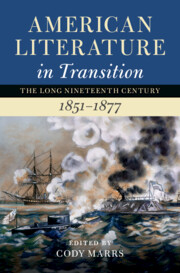Book contents
- American Literature in Transition, 1851–1877
- Nineteenth-Century American Literature in Transition
- American Literature in Transition, 1851–1877
- Copyright page
- Contents
- Figures
- Contributors
- Series Preface
- Introduction
- Part I Careers
- Part II Networks
- Part III Exchanges
- Part IV The Long Civil War
- Chapter 17 The Coming Civil War
- Chapter 18 Union Literature
- Chapter 19 Confederate Literature
- Chapter 20 Reconstruction Literature
- Chapter 21 The Global Civil War
- Index
Chapter 19 - Confederate Literature
from Part IV - The Long Civil War
Published online by Cambridge University Press: 15 June 2022
- American Literature in Transition, 1851–1877
- Nineteenth-Century American Literature in Transition
- American Literature in Transition, 1851–1877
- Copyright page
- Contents
- Figures
- Contributors
- Series Preface
- Introduction
- Part I Careers
- Part II Networks
- Part III Exchanges
- Part IV The Long Civil War
- Chapter 17 The Coming Civil War
- Chapter 18 Union Literature
- Chapter 19 Confederate Literature
- Chapter 20 Reconstruction Literature
- Chapter 21 The Global Civil War
- Index
Summary
Writing in 1883 to organizers in Sante Fe who had invited him to contribute a poem honoring the 333rd anniversary of the city’s Spanish settlement, Walt Whitman prophesied a future American civilization to embrace what he called – initially – “the Spanish element in our nationality”: To that composite American identity of the future, Spanish character will supply some of the most needed parts. No stock shows a grander historic retrospect – grander in religiousness and loyalty, or for patriotism, courage, decorum, gravity, and honor. … Then another point, relating to American ethnology, past and to come, I will here touch upon at a venture. As to our aboriginal or Indian population – the Aztec in the South, and many a tribe in the North and West – I know it seems to be agreed that they must gradually dwindle as time rolls on, and in a few generations more leave only a reminiscence, a blank. But I am not at all clear about that. As America, from its many far-back sources and current supplies, develops, adapts, entwines, faithfully identifies its own – are we to see it cheerfully accepting and using all the contributions of foreign lands from the whole outside globe – and then rejecting the only ones distinctively its own – the autochthonic ones?1
Keywords
- Type
- Chapter
- Information
- American Literature in Transition, 1851–1877 , pp. 306 - 321Publisher: Cambridge University PressPrint publication year: 2022

